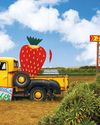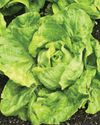
Perennial plants and plantings (by P definition, those living for more than two years) can be daunting. There is the extra cost; for many plants you'll be buying bulbs, potted plants or even trees, all of which cost more than seeds.
There is also the necessity for careful planning. True, the best annual gardens emerge when you know your soil's texture, fertility and drainage and what each of your plants prefers. But with perennial plantings, it's essential.
Lastly, perennials of various kinds bring with them the need to develop new and special skills sets. Pruning woody growth, dividing crowns, they are things you will want to learn for maintaining your perennial areas. So is adding perennials to your homestead truly worth it? You bet!
PERENNIAL PROFITS
There are many advantages to perennial crops, whether fruits, flowers, vegetables or herbs.
Because of their multiseasonal, established nature, they greatly contribute to the organic matter, porosity and water-holding capacity of the soil, meaning that over time, they'll be able to produce increasingly better crop outcomes.
Root systems, having years in which to grow, will reach to lower-level soil minerals and moisture and establish
beneficial relationships with mycorrhizal fungi. This will also enhance their ability to reach these resources. The result is increased drought resistance as well as a measure of disease and pest resistance and a more mineralrich foodstuff in the case of edibles.
Perennials kept in good shape will pay for themselves and more, not requiring the repeated outlay of money annuals do.
Esta historia es de la edición March - April 2023 de Hobby Farms.
Comience su prueba gratuita de Magzter GOLD de 7 días para acceder a miles de historias premium seleccionadas y a más de 9,000 revistas y periódicos.
Ya eres suscriptor ? Conectar
Esta historia es de la edición March - April 2023 de Hobby Farms.
Comience su prueba gratuita de Magzter GOLD de 7 días para acceder a miles de historias premium seleccionadas y a más de 9,000 revistas y periódicos.
Ya eres suscriptor? Conectar

The RISE of Opportunist WEEDS
Be prepared to see increasing changes in weeds we fight, such as poison hemlock and poison ivy, and in the crops we grow.

LIVESTOCK Health
Prepare yourself for how to spot symptoms of illness in your farm animals so that you can get them help before it's too late.

CUT FLOWER Farming
If you're considering growing flowers for sale, brush up on these five key things to know before diving in.

WINTER Survival
Keep your land, animals and yourself in good shape this winter with this helpful advice.

COVERAGE CONCERNS
Avoid common insurance mistakes for rural and hobby farm businesses.

FARMER'S GUIDE Berries
Set the stage for tasty strawberries, blueberries and brambles with these soil-boosting garden tips.

Preconditioning CALVES
Follow our step-by-step guide to get more money for your calves.

Soil Conservation
Often, outside of having a specific problem that needs to be addressed, soil conservation isn't something every farmer readily thinks about. Yet conserving the soil should be at or near the top of every farmer owner or manager's list of concerns because absent the prevention of soil erosion, we have the opportunity for another dust bowl.

Year-Round Lettuce & Salad Mixes
It's easy to think of salad greens as just a spring- or fall-garden crop, but it's possible to enjoy freshly harvested lettuces, mustards and more from your own garden year-round.

Barn Improvements
Days are never long enough for a farmer. From dawn to well into the night, tasks arise that often require immediate action. Having to search for tools or equipment is an enormous time waster and incredibly frustrating when you can't find what you need, especially when you know you have it.